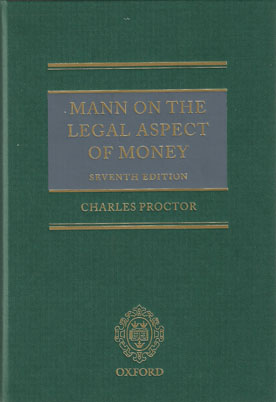
Providing a thorough legal analysis of money in all its aspects, Mann on the Legal Aspect of Money has been the leading text on the private and public law of money ever since the publication of the first edition in 1939.
This latest edition considers issues that arose in the course of the financial crisis, including the legal aspects of the Greek financial crisis, the implications of quantitative easing and the "lender of last resort" function of the central bank. Additionally, there is a new chapter on payment processes following the Payment Services Directive and legislation designed to reinforce legal arrangements in the context of payment systems.
In a private law context, the book deals with the nature of money and its use in the payment of private debts and the right to interest and damages in the event of a delay in the payment of a monetary obligation. It also addresses the implications of money laundering regulations, sanctions and similar legislation in the context of monetary obligations. From a public law perspective, it explores the legal consequences of inflation and the erosion of monetary value as well as the structure of national monetary systems, including monetary pegs, currency boards and dollarization.
In an international law context, the legal implications of monetary associations are considered including economic and monetary union in Europe. The text also considers the legal implications of fluctuating exchange rates and international obligations in relation to the national currency (e.g. exchange rate manipulation and discriminatory monetary practices).
The seventh edition of Mann gives an up-to-date and detailed discussion of current matters, whilst continuing to provide an in-depth analysis on all aspects of monetary law in a single reference source.